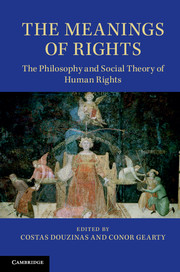Book contents
- Frontmatter
- Contents
- Notes on contributors
- Introduction
- Part I Finding foundations
- Part II Law, rights and revolution
- Part III Rights, justice, politics
- Part IV Rights and power
- 12 Second-generation rights as biopolitical rights
- 13 History, normativity, and rights
- 14 “All of us without exception”: Sartre, Rancière, and the cause of the Other
- 15 However incompletely, human
- 16 Welcome to the “spiritual kingdom of animals”
- Index
- References
15 - However incompletely, human
Published online by Cambridge University Press: 05 June 2014
- Frontmatter
- Contents
- Notes on contributors
- Introduction
- Part I Finding foundations
- Part II Law, rights and revolution
- Part III Rights, justice, politics
- Part IV Rights and power
- 12 Second-generation rights as biopolitical rights
- 13 History, normativity, and rights
- 14 “All of us without exception”: Sartre, Rancière, and the cause of the Other
- 15 However incompletely, human
- 16 Welcome to the “spiritual kingdom of animals”
- Index
- References
Summary
WE have hitherto considered persons in their natural capacities, and have treated of their rights and duties. But, as all personal rights die with the person; and, as the necessary forms of investing a series of individuals, one after another, with the same identical rights, would be very inconvenient, if not impracticable; it has been found necessary, when it is for the advantage of the public to have any particular rights kept on foot and continued, to constitute artificial persons, who may maintain a perpetual succession, and enjoy a kind of legal immortality.
In Königsberg at the end of the eighteenth century, “person” was the basic moral unit anchoring Immanuel Kant’s categorical imperative – the name for those creatures whose “rationality” and insuperable “dignity” “already marks them out as an end in itself.” In classical Greece, “person” referred to the “face,” which in Roman theater became a mask worn by an actor, and later the actor himself. In Philadelphia in 1787, at the US Constitutional Convention, “person” was the unit of measure that determined the apportionment of political representation to the states, based on a formula that counted “the whole Number of free Persons”; “all other persons” to be tallied at the discounted rate of five for three. In 1719, on an island in the Orinoco effluence, “person” referred to Poll, Robinson Crusoe’s domesticated parrot, who “was the only Person permitted to talk” to the shipwrecked sailor. In England, during the era of high imperialism, “person” was the legal fiction that gave life to the business corporation (the colonial charter company) and granted immortality to certain rights that would ordinarily “die with the [natural] person.” In 1947, “person” was the “continental” concept internationalized in the draft of the Universal Declaration of Human Rights (UDHR) that, according to Eleanor Roosevelt, started a “storm” among State Department lawyers who insisted that it was a legal figure alien to US law; the storm abated in embarrassment when it was discovered that there was indeed a precedent for “person” in US law, when Supreme Court Justice Roger Taney opined for the majority in the Dred Scott decision in 1857 that “a slave has no juridical personality” and therefore no right to recognition anywhere as a person before the law.
- Type
- Chapter
- Information
- The Meanings of RightsThe Philosophy and Social Theory of Human Rights, pp. 272 - 297Publisher: Cambridge University PressPrint publication year: 2014
References
- 1
- Cited by



